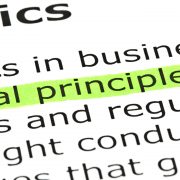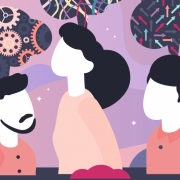In dealing with our dissatisfaction with the world, we turn to some kind of action.
As Mark Manson said:
“If you’re stuck on a problem, don’t sit there and think about it; just start working on it. Even if you don’t know what you’re doing, the simple act of working on it will eventually cause the right ideas to show up in your head. Action isn’t just the effect of motivation; it’s also the cause of it.”
Some of us might choose political action – voting, supporting a political party, protesting in the street. Others might choose social action at home or at school, and still others might choose workplace action.
The best form of action is entrepreneurial action. In America, we tend to think of entrepreneurship as starting a business, or owning or managing a small business, i.e. earning an income and building wealth through individual initiative rather than the dependent route of taking a job offered and controlled by an employer. But entrepreneurship can be viewed more broadly as being enterprising: assessing the present, and taking individual action to modify it to achieve personal objectives in the future. Entrepreneurship is synonymous with individual action – often arduous and difficult action which is valiantly undertaken – to make the world a better place. This better future is never pre-determined, but instead the entrepreneur imagines it as a possibility and creates it step-by-step.
Entrepreneurial action is not political – that would involve collectively fighting with others and aiming to take something away from them in order to redistribute it to one’s own group. It’s not social, in the sense that it is constituted by individual initiative; social benefits may emerge as the result of the workings of the invisible hand, but social goals do not drive entrepreneurial action. And it is not the workplace action of employees aiming to change their workplace.
Entrepreneurial action recommends itself on multiple fronts.
Entrepreneurial Action Aims Specifically At Creating Value For Others.
An entrepreneur creates economic opportunities (Peter Klein link) by identifying the dissatisfactions of others. Observing such a dissatisfaction, the entrepreneur imagines ways in which it can be removed and replaced with an improved experience. If they can bring the improvement to a customer successfully, they receive the appropriate marketplace reward, which is both economic and psychic – the good feeling of having improved another’s life in a way that is valued, and having successfully achieved their own economic goal.
In general, entrepreneurs are people who see the world as it is, imagine a better one (through the lens of others – potential customers), and bring it about. Entrepreneurship is creative action to help others, and serves the quintessential social function that makes life in society possible by adjusting and coordinating individual behaviors.
The Values-Based Entrepreneurial Ethic Is Highly Moral.
Entrepreneurs alleviate situations of need. Those can be customer needs or community needs or all kinds of other needs. The entrepreneur is someone who fixes them, and seeks a reward, either monetary or psychic or both. The entrepreneur is a creative actor driving the dynamic process of social coordination, in which the highest values are not those of economic efficiency but of the pursuit of good. People live their lives in the pursuit of their highest values, and entrepreneurs, alert to the needs that customers feel as they engage in the pursuit, seek the best way to help them. In such an entrepreneurial world, concepts of justice are not constructed on questions of distribution, but on the capacity of entrepreneurs to seek, discover and alleviate situations of need. The entrepreneurs who prove most adept at this social coordination function are the ones who reap the greatest rewards, which become their private property to save, spend or re-invest.
Entrepreneurship Makes Every Individual More Valuable.
Large corporations work hard to make their employees less valuable. They’d prefer lower wages for their workers, and they aim to standardize work so that any worker is interchangeable with another and, eventually, can be replaced by a robot or by software. Corporations intentionally devalue people. It’s true in regard to their customers, as well. They’d like to reduce customers to data sets and information profiles that can be analyzed, averaged, aggregated and manipulated so that digital methods can be used to maximize the cash flows that emanate from them. The trend is to depersonalize and to deny individuality.
Entrepreneurs first seek to make themselves more valuable to others. They seek to understand others’ needs and to serve them with a superior product or service to address those needs. Entrepreneurs are always trying to add to their own knowledge, expand their own capabilities, and to augment their own capacity in order to do a better job of serving others. They’re lifelong learners and avid skill gatherers. If they invite others to join their team, they treat them the same as they would treat themselves: make them as valuable as possible in order to have the capacity to create more value for customers and thus help the business grow.
Entrepreneurship Is An Alert, Discovery-Oriented Activity Aiming To Enhance Everyday Life For Everyone.
Entrepreneurs are always searching for what’s new, different and better, as judged by their customers who are the people who determine the entrepreneurs’ success. This is not dog-eat-dog competition where each one is trying to beat the other and win. This is collaborative striving for the best possible way to meet customer demands. It’s what drives technology and industry and the economy to higher and higher levels of performance. And, since the customer is the entrepreneur’s boss, it is customer goals after which entrepreneurs strive. Customer goals are for a better life: more comfort, more convenience, more capability, more confidence, more achievement, more excitement, more entertainment, more love, more peace. Entrepreneurs live to deliver these things. They’re in continuous discovery mode, alert to what’s new and better, on behalf of others who will be grateful when the discovery is brought to them.
How would you like to make yourself more valuable? What problems would you like to fix? You can do it by taking entrepreneurial action.













